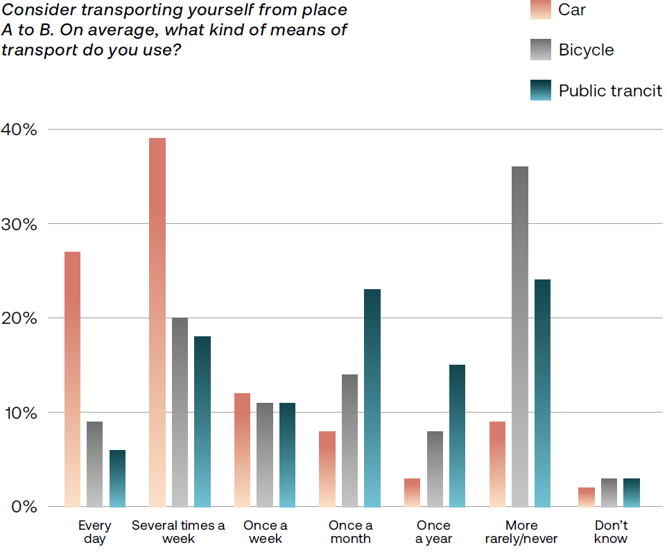Prices are going up for food, housing, and many other essentials in life; a lot of people feel that almost everything has become significantly more expensive over the past year, and we are adjusting many of our habits accordingly. However, our love affair with the car continues. This year’s Mobility Barometer shows that we are using our cars just as often as before, despite the economic downturn. 78 percent of us use cars at least once a week, the same as in 2023.
This solidifies the car as the overwhelmingly most popular means of transport, in all Nordic countries and among all groups. Sweden and Finland top the list, with 79 percent of the population hitting the road at least once a week, followed by Denmark (78) and Norway (76).
A long-lasting affection
This isn’t a new love affair; it dates to the late 19th century. Those early cars changed how people moved, offering freedom and flexibility like never before. Cars didn’t just get us from A to B — they became symbols of personal freedom and progress.
Fast forward to today, and transportation is going through major changes. Innovations are everywhere, from electric and self-driving cars to smarter public transit. Environmental concerns and the push for sustainability are driving these developments, opening new possibilities.
Why we won’t let go of the car
However, the car’s appeal remains strong, largely due to the unique advantages it offers, as highlighted in this report.
First, people in the Nordics find cars very convenient.
Unlike other forms of transportation, cars provide a level of flexibility that is hard to match, especially in areas where public transit is underdeveloped or unreliable. More than four out of ten consider cars easily accessible, and nearly 60 percent associate cars with comfort — a significantly higher score compared to all other means of transportation.
In addition, the evolution of automobile technology also seems to have contributed to sustaining its appeal. Today’s cars are equipped with advanced features designed to enhance efficiency and reduce environmental impact. These innovations show that the automobile can continue to evolve in alignment with modern values without sacrificing its core benefits, even though much work remains to be done to reduce emissions.
Biking becomes more popular
The transportation landscape is undoubtedly shifting. Cities worldwide are increasingly investing in green infrastructure, introducing dedicated bike lanes, expanding pedestrian zones,and enhancing public transit options. Ridesharing and car-sharing services offer seemingly practical alternatives to traditional car ownership.
One effect of this development might be that cycling has become more popular over the past year, according to the survey. 40 percent now say they use a bike at least once a week, compared to 33 percent in 2023, making it the second most popular means of transportation.
The use of public transportation remained stable between 2023 and 2024, with 35 percent saying they use a bus, tram, or subway at least once a week.
In short, the Mobility Barometer highlights an interesting reality: While there are new ways to get around, people still rely on cars, even when money is tight. The mix of convenience, flexibility, and availability keeps cars relevant.
Simply put, the car is still king.







